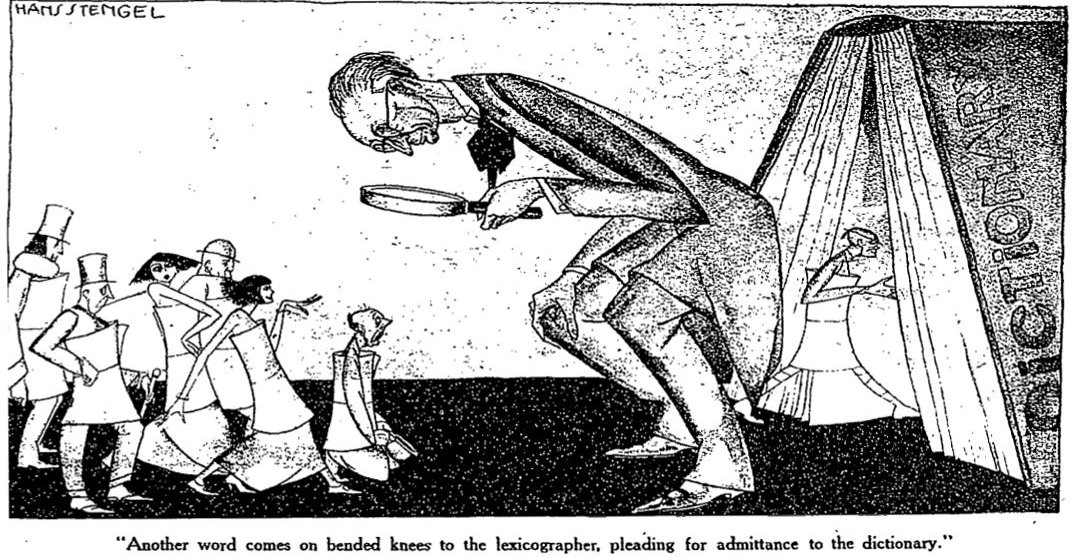Lumpatious lexicography
« previous post | next post »
In the latest episode of "Sam & Cat," a teen comedy on Nickelodeon, the plot takes a lexicographical turn. As Nickelodeon describes it,
Sam and Cat make a bet with the annoying older brother of a babysitting client that "lumpatious" is a real word. When they discover it is not, they must figure out how to get it in the dictionary.
The whole "get a word in the dictionary" plot line is highly reminiscent of the "Kangamangus" episode of Comedy Central's "Sarah Silverman Program," which I discussed here when it aired back in 2008. Whereas the "Sarah Silverman" characters try to get a word past the gatekeepers at the Oxford English Dictionary, the "Sam & Cat" characters approach a lightly fictionalized version, the Oxnard English Dictionary (allowing the show to make various jokes about Oxnard and its strawberries, aka "nardberries"). The dictionary's austere "Word Keepers" say that they will officially recognize "lumpatious" if a famous person uses it, and the young protagonists manage to get the governor of New Jersey to oblige — in a spoof of Gov. Chris Christie that ended up being perfectly timed for the Bridgegate scandal troubling the real-life Christie.
What I wrote about the "Sarah Silverman" episode in a New York Times opinion piece about a year ago holds true here:
It’s exciting to think of dictionaries in more dramatic terms: as battlegrounds where the fate of the language is decided, or as shadowy enterprises with secret, back-room meetings over what does and does not count as a word. These images flourish because of widespread misconceptions in the popular imagination about how dictionaries get made.
One of my favorite recent portrayals of lexicography, once again involving the O.E.D., was in a 2008 episode of Comedy Central’s “The Sarah Silverman Program.” On the show, Ms. Silverman’s character tries to popularize a new slang word (“ozay”), but her friend Brian ends up finding more success with his own coinage (“dot-nose”). By the end of the episode, dot-nose has become so popular that an O.E.D. editor pays Brian a visit to tell him it is entering the dictionary, inviting him to the official “Word Induction Ceremony.”
Sad to say, there is no such thing as a Word Induction Ceremony, though dictionary publishers do try to milk some publicity out of batches of new words added to their latest editions. Still, the scene highlights the common belief that admission to a dictionary (especially a prestigious one like the O.E.D.) awards “official” status to a new word. And if the Almighty Dictionary is the anointer of wordhood, then surely those who make these decisions must be blessed with some sort of semi-divine authority!
Now the teens and tweens who comprise the Nickelodeon set are being exposed to the transmogrification of dictionary drudgery into Dan Brown-style melodrama.
And because it never gets old, here's a wonderful depiction of lexicographical gatekeeping by Hans Stengel, from the June 3, 1923 issue of the New York Times Sunday Magazine (click to embiggen):

Private_Zydeco said,
January 13, 2014 @ 1:47 am
11!1!! F1R57 C0MM3N7 ! M045T 1N73N517Y !1!11
(and for would-be "nardcore" fans, Uphill Battle :
http://www.youtube.com/watch?v=IlsNsjo5-24)
[(bgz) "Nardcore" is an offshoot of hardcore punk that takes its name from (Ox)nard. No two ways about it, nard is a funny syllable. (Cf. Andy Bernard of "The Office," aka "the Nard Dog.")]
AJD said,
January 13, 2014 @ 1:52 am
I assume the official Word Induction Ceremony is not unlike this ceremony described by John Lawler some years ago?
marie-lucie said,
January 13, 2014 @ 9:11 am
Thanks for the link, AJD. A most ceremonious ceremony!
Jerry Friedman said,
January 13, 2014 @ 1:50 pm
"Lumpatious" would do nicely to describe a scholar who argues that several previously accepted classes, such as parts of speech, are really subclasses of a single class.
John Lawler said,
January 13, 2014 @ 1:55 pm
I hear it as
lumpaceous adj. 'of or pertaining to a breast lump, or surgery on it' (see also lumpectomy
Eric P Smith said,
January 13, 2014 @ 7:54 pm
Sam and Cat got it into the dictionary, or a dictionary at any rate: http://www.urbandictionary.com/define.php?term=lumpatious.
Nice example of a self-fulfilling prophecy.
Rod Johnson said,
January 13, 2014 @ 8:56 pm
Ben: Nard'n'Pat would surely agree.
a George said,
January 14, 2014 @ 11:51 am
I can't help it, but to me it appears as if it describes persons who belong to the Lumpenproletariat. W…. trash?
Cygil said,
January 15, 2014 @ 3:29 am
@Eric P Smith
Given the #blatantneediness of the #hashtag #lumpatious, I would imagine that's some staffer at Nickelodeon desperately attempting to make this a #thing.
Is it still a teen comedy if, from the clip, neither character appears to be a teenager and there's no actual comedy?
J. W. Brewer said,
January 16, 2014 @ 11:14 am
I think its audience is probably more heavy on the "tweens" as the marketing people now call them than on actual teens.